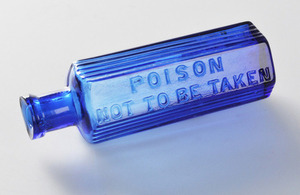Poisons service issues ‘legal highs’ alert
Fresh warnings about so-called ‘legal highs’ are today sounded by the National Poisons Information Service (NPIS) in its annual review.

Poisons bottle
NPIS, which is commissioned by Public Health England (PHE), is a poisons advisory service for healthcare professionals working in the NHS in England, Scotland, Wales and Northern Ireland.
The service’s annual review, which is published today (30 August 2013), says that between April 2012 and March this year phone calls to experts about ‘legal highs’ went up 49%, from 116 in 2011 to 2012 to 173 in 2012 to 2013, and searches for information on ‘legal highs’ on NPIS’ online database TOXBASE, climbed by 128%, from 1125 to 2561 in the same period.
Professor Simon Thomas, Director of NPIS’ Newcastle unit, said:
Two years ago we reported that queries around treatments for mephedrone, an at-the-time popular ‘legal high’ had tailed off after the government took steps to ban it.
This year we’ve seen rises in queries about other ‘legal highs’. Many of these are variations on existing illegal substances. Although they may not be illegal to possess, users should not think this means they are safe for human use – far from it.
People should be aware that as many of these products are relatively new there is much less information available about their safety.
Some legal substances can be as, and sometimes more, hazardous than their illegal counterparts. These substances are also dangerous because it can be hard to identify their active constituents and there is lack of experience of their adverse effects, making it difficult for treating clinicians to manage people experiencing toxic effects effectively.
Remember just because it is legal does not mean it is safe.
This year’s review also confirmed an increase in calls about, and numbers of patients being treated for, carbon monoxide poisoning, from 248 in 2011 to 2012 to 434 in 2012 to 2013. Also throughout the year more than 50,000 calls were made to NPIS on a variety of topics and its online database TOXBASE was used more than 1.6 million times.
The review also mentions that 2013 marks the 50th anniversary of NPIS and in 2012 to 2013, just as in 1963, accidental child poisonings in the home prompted a large proportion of calls to the experts.
Professor Thomas, said:
In 1963 about two thirds of the phone calls made to NPIS concerned children exposed to various household products.
In 2013 accidental poisonings of children in the home remain a significant concern, with almost 14,000 telephone enquiries received about children under 5, representing almost 30% of the calls we received.
Simple steps can make a big difference. Safe storage of medicines and other hazardous household products in their original childproof containers, locked away separately from food and drinks can help parents and carers reduce the risk of children coming into contact with substances that might harm them.
The way our service works has changed hugely over the last 50 years but what has not changed is our ability to be able to spot emerging trends and flag them with the government, regulators, public health professionals and clinicians.
Although the way we deliver our service today is very different from when NPIS was set up 50 years ago, the focus of what we do – providing expertise to frontline doctors and nurses for the best possible treatment of patients – is unchanged.
Ends
Notes to Editors
-
Read the new NPIS annual review. Copies can be emailed on request and experts are available for interview, call 01235 825 406 or 01235 825 405 for details.
-
NPIS is a clinical toxicology service for healthcare professionals working in the NHS. It is endorsed by the Department of Health (DH) and commissioned by PHE. It provides expert evidence-based advice on all aspects of acute and chronic poisoning, supporting best practice in the diagnosis and management of patients who may have been accidentally or deliberately poisoned, whether by ingestion, injection, inhalation or skin or eye contact. For more information visit the NPIS website.
-
PHE commissions 4 units of NPIS at Birmingham, Cardiff, Edinburgh and Newcastle to provide information and support on the diagnosis and management of poisoning to health care professionals in the UK.
-
In 1963 to 1964 NPIS handled more than 2,000 phone enquiries; last year their experts handled more than 50,000.
-
Public Health England’s mission is to protect and improve the nation’s health and to address inequalities through working with national and local government, the NHS, industry and the voluntary and community sector. PHE is an operationally autonomous executive agency of the Department of Health.
UKHSA press office: CRCE
Centre for Radiation Chemical and Environmental Hazards (CRCE)
Chilton
Oxfordshire
OX11 0RQ
Email crce-pressoffice@phe.gov.uk
Telephone 01235 825 406
Alternate telephone Tel: 01235 825 405
Out of hours 020 8200 4400